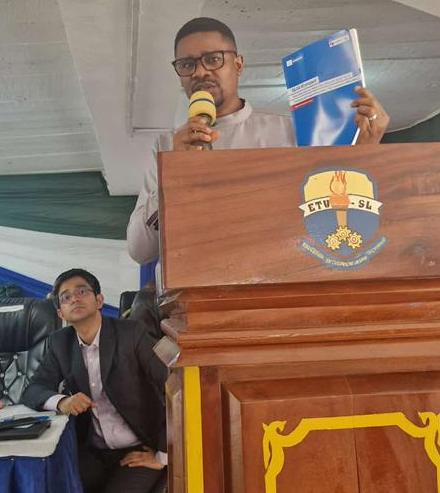The national launch of the five years Better Education for Africa’s Rise Project (BEAR-3), funded by the Ministry of Education in Korea through UNESCO, has been held at the Eastern Technical University, in Kenema, eastern Sierra Leone.
A major outcome of this project will be increasing productivity, enhancing food availability, and reducing dependence on imports. Aligned with national development plans, BEAR 3 also focuses on the value-chain in respect of certain agric products (rice, cocoa, cassava, etc.) and post-harvest management. It will further direct the attention to systems strengthening such as the establishment of Sector Skills Councils and the development of National Competency/Occupational Standards that will make agriculture attractive to young people and Job Creation in Sierra Leone.
Delivering the keynote address, the Deputy Minister of the Ministry of Technical and Higher Education, Sarjoh Aziz-Kamara, stated that the BEAR-3 would support the agricultural sector, specifically the “Feed Salone” initiative in the Big 5 Game Changers.
Sarjoh Aziz-Kamara emphasised that the BEAR-3 programme was part of the delivery of the ambitious vision to transform Sierra Leone and that all stakeholders had a significant role to play especially development partners. “The development trajectory of this country will be achieved when we fully consolidate the gains of TVET”, he said.
Mr Aziz-Kamara made it clear that the Ministry was on a journey of TVET transformation and thanked the visionary leadership of President Julius Maada Bio. He added that in six years, they had been on a progressive path to change narratives of TVET, to make TVET attractive, and to change perceptions about TVET in Sierra Leone.
“Essentially, we are building on the significant successes they have made in training over 20,000 people with majority youths and women funded by the World Bank. SDP ended in June, and we are looking forward to a second generation Skills Development Project. In fulfilling our mandate and delivering on President Bio’s HCD agenda, we have transformed Eastern Polytechnic and MMTU to technical universities. Clearly, this has set the foundation for TVET and supported strides towards ensuring our population acquires 21st-century skills-sets for science, technology, and innovation”, he disclosed.
The Deputy Minister of the Ministry of Technical and Higher Education continued: “There has also been a major policy shift, learning from best practices in the world. We have had study tours (Korea, Japan, China, Kenya, and Ghana) to drive this agenda. We have completed DAP, and NQF is in the finalization phase, focusing on CBET. A labour market survey has been completed to ensure the skills our young people acquire are aligned with industrial requirements and lead to employment. Building partnerships with the private sector is also a critical element to promote job creation, and we are encouraged by their cooperation”.
Ending his keynote address, Sarjoh Aziz-Kamara expressed thanks and appreciation to UNESCO for their commitment and collaboration to take this project forward. He also applauded FAO for hosting the project and for ongoing partnership to achieve the project outcomes within the timeframe.
A major highlight of the launching was the Deputy Minister formally inaugurating the BEAR-3 project steering and technical committees, respectively. Both committees have a responsibility for oversight and successful timely delivery of the project in line with the outcomes.
The launching ceremony was attended by various dignitaries across all sectors, including UN Country Team, UNESCO Head of Abuja Office and UNESCO Representative to Nigeria, – Mr Abdourahamane Diallo, UNESCO Regional Coordinator – Manish Joshi, the Vice Chancellor and Principal of ETU, Prof. M. T. Lahai, representatives from the MTHE.


